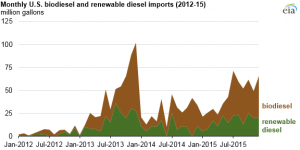According to a recent Today in Energy, published by the Energy Information Administration (EIA), biodiesel production is back on the growth track. In 2014 amid concerns over the Renewable Fuel Standard (RFS) and the expiration of the biodiesel blender’s tax credit, biodiesel production dropped after reaching record production levels in 2013. However, as biodiesel blends were increased for 2015 under the RFS, U.S. imports of biodiesel and renewable diesel increased by 61 percent in 2015 reaching 538 million gallons of production.
 The most influential drivers of the increase has been increasing RFS targets and the biodiesel tax credit, although it has lapsed and been reinstated several times. Another driver is California’s Low Carbon Fuel Standard (LCFS). In addition, biomass-based diesel fuels have additional advantages over other renewable fuels due to their relatively high energy content and low carbon intensity, which allow them to qualify for higher credit values in both renewable fuel programs.
The most influential drivers of the increase has been increasing RFS targets and the biodiesel tax credit, although it has lapsed and been reinstated several times. Another driver is California’s Low Carbon Fuel Standard (LCFS). In addition, biomass-based diesel fuels have additional advantages over other renewable fuels due to their relatively high energy content and low carbon intensity, which allow them to qualify for higher credit values in both renewable fuel programs.
Today U.S. biodiesel and renewable diesel are primarily made from soybean oil, waste vegetable oils or animal fats. The blends range from B5, or five percent biodiesel, 95 percent diesel, to B20. The difference between biodiesel and renewable diesel is that renewable diesel meets specifications for use in existing infrastructure and diesel engines and not subject to blending limitations. However, it should be noted that all diesel engines can use biodiesel blends.
In terms of biodiesel imports, more than half the gallons came from Argentina (183 million gallons of 334 million gallons). In January of 2015, the EPA approved the RFS pathway for Argentinean biodiesel allowing the fuel purchased to quality for Renewable Identification Number (RIN) credits. The remaining gallons came from Indonesia and Canada. EIA reports that all U.S. renewable diesel imports in 2015 were sourced from Singapore and entered the country primarily through West Coast ports, likely destined for California LCFS compliance.

